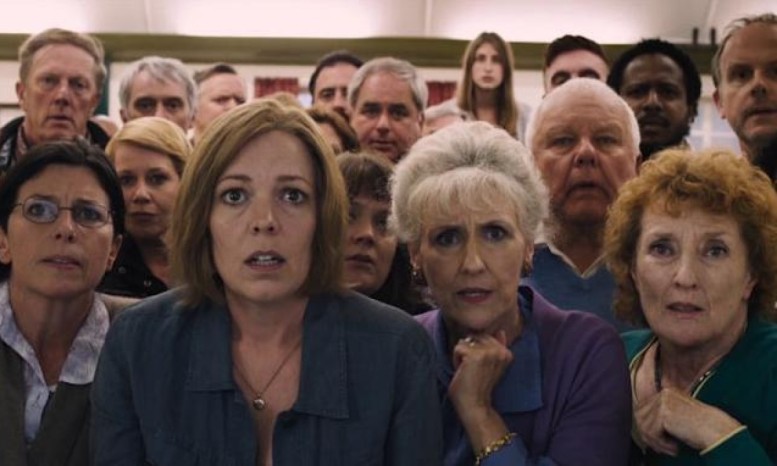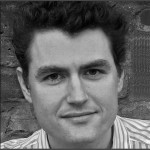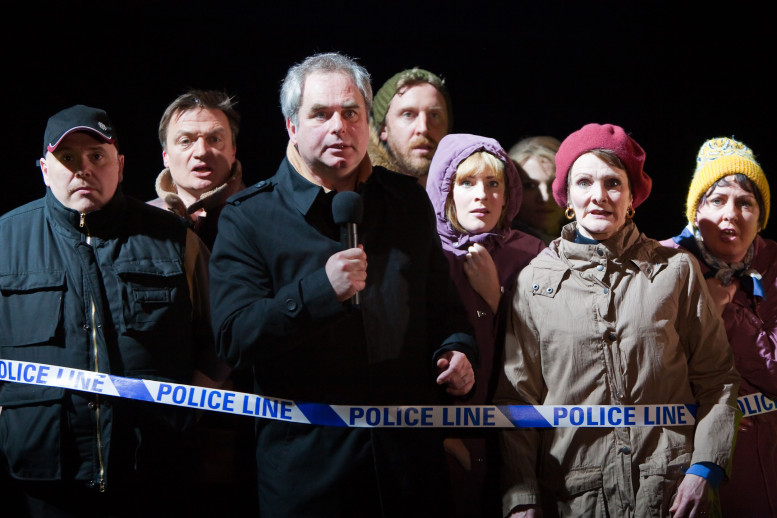The verbatim film musical “London Road,” starring Oscar-nominee Tom Hardy, opened last week at select theaters in the United States. The show, written by Alecky Blythe (book) and Adam Cork (music), began as a stage production at the National Theatre in London. Extended Play is publishing interviews our contributors conducted with members of the creative team and cast over the next few weeks. Read the conversation with the film’s screenwriter, Alecky Blythe, we published last week here. And to find out where you can see the film, click here.
MICHAEL FRIEDMAN: What are you working on right now?
ADAM CORK: I’ve just come to the end of a very busy period of working back to back on three plays in a row.
MICHAEL: Oh dear.
ADAM: Which before I wrote “London Road” was, and still is, my day job. It’s what I grew up doing. It’s what I do to get by. Writing the music and designing the sound for plays, essentially, straight plays.
MICHAEL: Yeah.
ADAM: Not pieces of musical theater. And I’m also currently working on a new musical, which I hope to finish, or at least finish a good first draft of, in the next couple of months.
MICHAEL: Oh fantastic. May I ask what it is?
ADAM: I’m not talking about what it is until I’ve finished it.
MICHAEL: I understand. No, that’s why I asked your permission! I guess that’s what I’m interested in because your background is so much in working on sound and music for plays. What was the very first time that you started music and lyrics? Where did that first come from before “London Road?” “Enron,” I guess, is what I’d seen of yours.
ADAM: Oh, “Enron.” Yes. Well that’s a good example of music and lyrics, which I’d put together. I suppose yeah, the process of working on songs and plays has helped. I also was really into theater generally, particularly musical theater at university, quite a long time ago now. And I spent some time directing. Things like the “Threepenny Opera,” and being in things like “Sweeny Todd” and “Into the Woods” in student productions. And MD-ing “Cabaret.”
MICHAEL: I think it turns out we all MD-ed “Cabaret” and that we were all in “Into the Woods.”
ADAM: (laughing) I suppose even though I didn’t really end up working in musical theater as such, that culture seeped into my bones at quite a young age. And although I never delved into it, I tried to absorb it encyclopedically, in a way that I’m more trying to do now really, in the way with “London Road.” And the thrill of writing something original — where you’re a co-author, and people like it. You must know what that’s like from writing things like “Bloody Bloody Andrew Jackson.”
MICHAEL: Yes, yes, yes.
ADAM: Yes, there’s nothing quite like it is there?
MICHAEL: No, I mean it goes both ways, you know? I find it a relief. I just did two plays back to back, and it’s a relief sometimes to go back to be like, “Someone else tell me what vision I’m serving.” It’s nice; do you know what I mean? It goes both ways.
ADAM: On paper, that’s the great thing about going back to the day job. But then if you end up with someone who actually doesn’t know what they want just as much vision, but not receive any credit for authorship.
MICHAEL: Yes, that’s true. Actually, tell me about “Enron.” I was really interested in that because that, like “London Road,” was based on actual events and real people and even real words. Could tell me how the song aspect of that came about.
ADAM: Well I was working for Rupert Goold. He loves the multimedia approach, and he likes to bring together loads of different ingredients when he’s telling a story and flick between them quite quickly. So you might go from video leading to underscoring leading to song leading. And he was quite clear from the beginning, in the script — and I think it might have been a thing that he and Lucy Prebble cooked up together — that when we’re introduced to the traders on the trading floor that there should be something that we introduce as a story idea musically. And it lends itself to a choral treatment in a way. But there were minimal lyrics on page — it was one line. So I expanded those and researched commodities, and trading floor language. And then wrote something quite polyphonic and fugal.

MICHAEL: Yeah, that surprised me when I saw it. I loved it, but it was not what I expected at all.
ADAM: It was all inspired really by the idea of the graph. So the vocal lines were going up when the prices went up and down when the prices went down. Suddenly lurching, like the market does. I had begun work on “London Road” at that stage, and I think the techniques of documentary songwriting that I was developing in writing “London Road” probably fed into my approach to “Enron.” Although totally different, because I’m working from text on the page with “Enron.”
MICHAEL: Of course… You mentioned the techniques that you were developing then, so could you expand on that a little bit?
ADAM: When I first met Alecky Blythe, who is a verbatim playwright of a very particular kind, in that she doesn’t approach verbatim in the way that a playwright like Richard Norton-Taylor, who has done a lot of work at the Tricycle Theatre in London might approach it. He’ll take transcripts from tribunals and court cases and things like that and edit that text into something play-like, which actors then read off the page and supply their own interpretive dimension. Alecky starts with interviews and stays with the audio from those interviews… And we did a lot of that work together. So crucially, with her approach to verbatim, it’s as much — if not more — to do with the how of what is said as it is to do with the what.
So you’re really focusing in on those little hesitations, the ‘ums’ and the ‘ahs’ that occur in natural, everyday, spontaneous speech. And also, I took an increasingly, almost fascistic approach to my transcription, in the sense that it got more and more detailed and more and more true to what I was hearing. Listening over and over again to these spoken lines, and really nailing the pitch of each syllable. And really nailing, I wouldn’t say the rhythm, but something that reads as that rhythm within my tempo and mood of choice in a true-to-life way. And what I ended up with was very, very complex lines, without much in the way of internal repetition. Obviously, none of it is versified to begin with, so lines would overhang traditional phrase ends by a long way, or fall short of them. But I ended up underpinning all of that with quite traditional strong foursquare type musical structures, just to contain it, in a way. And I suppose supplying extra repetitions and things like that to flesh out the structure and make it feel less anarchic.
I ended up wanting to infuse every single line, even if it’s a recitative type section, with the sense of a well-known tune. So the idea was that anyone listening to it might be able to listen back to it again and again and again and again. It would seep in the way that a famous simple tune might seep in, except it’s very complicated, and it goes like this and up and down. And I found that really worked, once it was rehearsed up by the brilliant performers we cast.
MICHAEL: Was that a difficult process — getting them in on that process?
ADAM: Casting wasn’t difficult, because we were lucky enough to be working at the National Theatre, so there were lots of people who we were able to get in. Who were keen to work on the project. So it wasn’t difficult in that sense, but finding the right performer was quite crucial, because they needed not only to have the musical chops to look at this very complex score and absorb it properly and meticulously, but then to convert back what they had learned without sacrificing any of its musicality and pitch and rhythm information into something that felt, again, like spontaneous speech. And I was thrilled by the fact that we were able to fill all eleven chairs with people who could do that. It was thrilling to watch that happen. We only had six weeks, and I think by week four, people were having nervous breakdowns. We got to week six, and they’d rallied, and they were there. I remember Claire Burt, who is one of the actresses — brilliant, brilliant performer; she’s in the film, too — saying, “Oh, you know, two weeks ago I was suicidal, and now it all feels like it’s all in four four in C major, it’s fine.”
And of course, because those language rhythms had been so faithfully preserved — first of all by me and the score, and secondly by the actors in their meticulous approach to the learning — it converted back into something that, even though it was complex, everyone in the audience immediately and intuitively understands it. Because it’s not complex academic language. It’s not elite language. It’s language spoken by ordinary people in ordinary homes in an ordinary, average part of Britain. And so it’s something that seemed to speak to everybody in the audience, very directly.
MICHAEL: Was that a surprise to you when that first?
ADAM: It’s what I was aiming for, so I mean it was a really pleasant surprise that it did work. And that everybody was on board with that and got it.
MICHAEL: Was the idea for the show at the National Alecky’s?
ADAM: In terms of the idea for the story itself, Alecky was already researching these events. They were ongoing when we met, in fact. The reason we met is that the National Theatre studio organized a workshop week involving three playwrights and three composers — the idea being to develop new forms of musical theater. An experimental week, in a way. And they pulled our names out of hats, somehow. I think they knew of us as people working in the industry, and we got the call, and we met each other. I think we were paired up randomly without any particular design. So she and I went off into a room and she said, “Well, you know I do verbatim.” And I said, “Oh, how does that work?” And she described it. And I got thinking about how that could work, what the musical analogies of that would be. The material for what became “London Road” happened to be one of two projects that she was currently working on. And she showed me both of them and we both agreed that that material had the most narrative interest. So, you know, there’s an element of fortuitousness and serendipity I suppose.
MICHAEL: (laugh) Always. Were you involved in the interview process? Or did you stay out of the interview process?
ADAM: No, that’s something that Alecky did all by herself. She was quite funny, because we did that first workshop and presented a couple of songs at the end, and the powers that be at the National liked it enough to say, “Oh come back and do another workshop.” So we did another workshop, and then they liked it enough to commission us to write something properly… But the strange thing was that, with each successive workshop week, there seemed to be developments emerging in the story in Ipswich. Which meant that Alecky would show up Monday morning and say, “I’m really sorry Adam, but I’ve got to go off and interview some people in Ipswich for the next couple of days.” But actually that was fine, because what the workshops enabled me to do was to carve out the time to do a lot of writing.
MICHAEL: It sounds like Alecky’s process is pretty specific. Where did you find how the songs would work within the storytelling?
ADAM: It’s different on a song-by-song basis, to be honest. Alecky came from the world of straight theater, not musical theater. And I took us through basic, lyric-type rules of verse-chorus structure and rondo form and these things, just to give her a little bit of an idea. And that fed a few of the songs. And then there were other songs where she gave me her edited material, already distilled into something very powerful, and I added what you might call the song structure or the chorus lines. I suppose a good example of that is “The Verdict,” which is a five minute long sequence towards the end, where the murderer is found guilty on all five counts. And originally that’s a recording — and it’s pretty much unedited, I think — of two reporters standing next to each other as the news comes through. It’s two voices talking over each other, telling the same story, and receiving the information about that story at the same time through earpieces. But of course, being individuals who are riffing on the moment, they tell the story in ways that are subtly different from each other, which I found fascinating. But then I thought, how can we dramatize this? So I imagined what the voices in the ear might be saying. So I added a chorus of journalists who were shouting numbers in a slightly Einstein-on-the-Beach way. To prompt the two reporters. To deliver the information that they are getting. And I also expanded the pair to a central quartet, so as each verdict came in, an additional voice could join, and sometimes they were singing all four different things separately and polyphonically. And at other times, they would join with each other, and it was pairings, and the whole thing collapses. It gets very busy around the fourth verdict, and then collapses down to unity and unison on the announcement of the fifth and final verdict. So I suppose that I was using traditional musical means to create dramatic form in that sense, for that piece specifically. But I didn’t really set out with any of the songs with a prescriptive idea of applying rules. I just responded to the material and I knew when it wasn’t working because it just wasn’t right. It’s the way I compose, I write a load of crap, and I dismiss everything that is not it until I come up with something that isn’t not it, if that makes sense.
MICHAEL: Which is probably maybe the best any of us ever do. “I know this is not not it.”
 Adam Cork is composer and co-lyricist of the documentary opera/musical “London Road,” which had an extended run at the National Theatre (Cottesloe) and then transferred for a 2012 run in the Olivier auditorium. He received a Tony Award in 2010 for his music and sound score for “Red” (Donmar/Broadway) and an Olivier Award in 2011 for “King Lear” (Donmar). Adam was also nominated in 2010 for the Tony Award for Best Score (Music & Lyrics) for “ENRON” (Broadway/West End).
Adam Cork is composer and co-lyricist of the documentary opera/musical “London Road,” which had an extended run at the National Theatre (Cottesloe) and then transferred for a 2012 run in the Olivier auditorium. He received a Tony Award in 2010 for his music and sound score for “Red” (Donmar/Broadway) and an Olivier Award in 2011 for “King Lear” (Donmar). Adam was also nominated in 2010 for the Tony Award for Best Score (Music & Lyrics) for “ENRON” (Broadway/West End).
Other award nominations include the Tony Award Best Sound Design of a Play for both “Macbeth” (2008) and “ENRON” (2010), an Olivier nomination for Best Sound Design for “Suddenly Last Summer” (2005) as well as four Drama Desk nominations: Outstanding Music in a Play for “Frost/Nixon” (2007) and “Red” (2010) and Outstanding Sound Design for “Macbeth” (2008) and “ENRON” (2010).
He was awarded the 2011 Evening Standard Award for Best Design for “Anna Christie” and “King Lear” and the 2011 Critics’ Circle for Best Musical for “London Road.”
Author
-

Michael's recent credits include the musicals “Unknown Soldier,” “Pretty Filthy,” “The Fortress of Solitude,” “Love’s Labour's Lost” and “Bloody Bloody Andrew Jackson,” the last of which premiered at the Public Theater before transferring to Broadway. With the Civilians, he has also written music and lyrics for “Canard Canard Goose,” “Gone Missing,” “Nobody’s Lunch,” “This Beautiful City,” “In the Footprint” and “The Great Immensity,” and music for Anne Washburn's “Mr. Burns.” With Steve Cosson, he is the co‐author of “Paris Commune” (BAM Next Wave Festival). Friedman has been a MacDowell Fellow, a Princeton Hodder Fellow, a Meet The Composer Fellow and a Barron Visiting Professor at the Princeton Environmental Institute. His TedX talk, “The Song Makes a Space,” can be seen on YouTube. An evening of his songs was featured at Lincoln Center’s American Songbook, and “The New Yorker Radio Hour” on WNYC features his songs about the 2016 election. He is artist in residence and director of the Public Forum at the Public Theater, and received an Obie Award for sustained achievement.
View all posts









